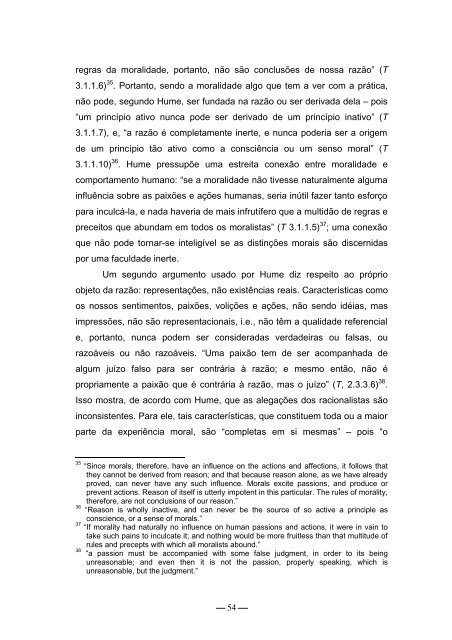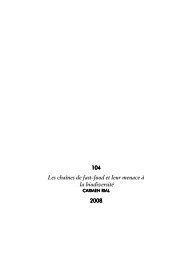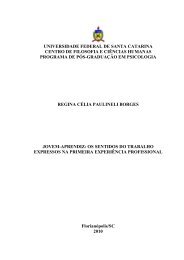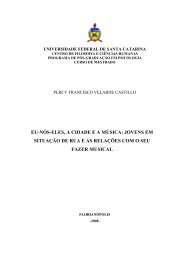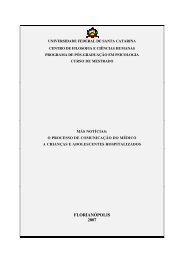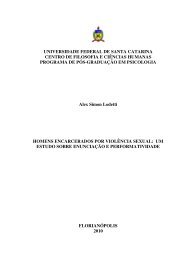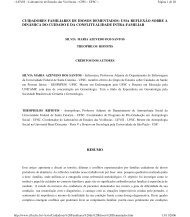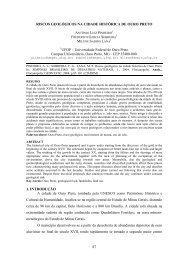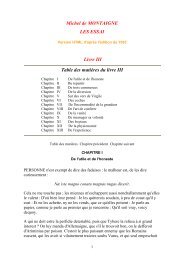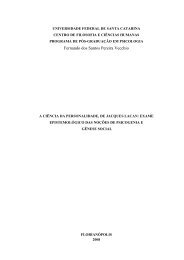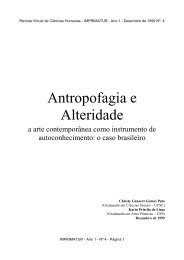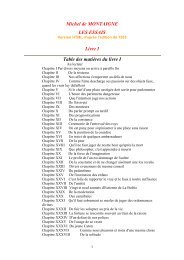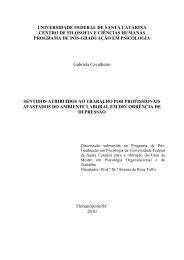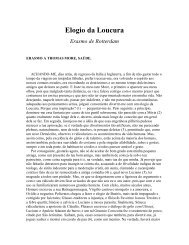A natureza da moral de Hume - CFH
A natureza da moral de Hume - CFH
A natureza da moral de Hume - CFH
Create successful ePaper yourself
Turn your PDF publications into a flip-book with our unique Google optimized e-Paper software.
egras <strong>da</strong> <strong>moral</strong>i<strong>da</strong><strong>de</strong>, portanto, não são conclusões <strong>de</strong> nossa razão” (T<br />
3.1.1.6) 35 . Portanto, sendo a <strong>moral</strong>i<strong>da</strong><strong>de</strong> algo que tem a ver com a prática,<br />
não po<strong>de</strong>, segundo <strong>Hume</strong>, ser fun<strong>da</strong><strong>da</strong> na razão ou ser <strong>de</strong>riva<strong>da</strong> <strong>de</strong>la – pois<br />
“um princípio ativo nunca po<strong>de</strong> ser <strong>de</strong>rivado <strong>de</strong> um princípio inativo” (T<br />
3.1.1.7), e, “a razão é completamente inerte, e nunca po<strong>de</strong>ria ser a origem<br />
<strong>de</strong> um princípio tão ativo como a consciência ou um senso <strong>moral</strong>” (T<br />
3.1.1.10) 36 . <strong>Hume</strong> pressupõe uma estreita conexão entre <strong>moral</strong>i<strong>da</strong><strong>de</strong> e<br />
comportamento humano: “se a <strong>moral</strong>i<strong>da</strong><strong>de</strong> não tivesse naturalmente alguma<br />
influência sobre as paixões e ações humanas, seria inútil fazer tanto esforço<br />
para inculcá-la, e na<strong>da</strong> haveria <strong>de</strong> mais infrutífero que a multidão <strong>de</strong> regras e<br />
preceitos que abun<strong>da</strong>m em todos os <strong>moral</strong>istas” (T 3.1.1.5) 37 ; uma conexão<br />
que não po<strong>de</strong> tornar-se inteligível se as distinções morais são discerni<strong>da</strong>s<br />
por uma facul<strong>da</strong><strong>de</strong> inerte.<br />
Um segundo argumento usado por <strong>Hume</strong> diz respeito ao próprio<br />
objeto <strong>da</strong> razão: representações, não existências reais. Características como<br />
os nossos sentimentos, paixões, volições e ações, não sendo idéias, mas<br />
impressões, não são representacionais, i.e., não têm a quali<strong>da</strong><strong>de</strong> referencial<br />
e, portanto, nunca po<strong>de</strong>m ser consi<strong>de</strong>ra<strong>da</strong>s ver<strong>da</strong><strong>de</strong>iras ou falsas, ou<br />
razoáveis ou não razoáveis. “Uma paixão tem <strong>de</strong> ser acompanha<strong>da</strong> <strong>de</strong><br />
algum juízo falso para ser contrária à razão; e mesmo então, não é<br />
propriamente a paixão que é contrária à razão, mas o juízo” (T, 2.3.3.6) 38 .<br />
Isso mostra, <strong>de</strong> acordo com <strong>Hume</strong>, que as alegações dos racionalistas são<br />
inconsistentes. Para ele, tais características, que constituem to<strong>da</strong> ou a maior<br />
parte <strong>da</strong> experiência <strong>moral</strong>, são “completas em si mesmas” – pois “o<br />
35<br />
“Since <strong>moral</strong>s, therefore, have an influence on the actions and affections, it follows that<br />
they cannot be <strong>de</strong>rived from reason; and that because reason alone, as we have already<br />
proved, can never have any such influence. Morals excite passions, and produce or<br />
prevent actions. Reason of itself is utterly impotent in this particular. The rules of <strong>moral</strong>ity,<br />
therefore, are not conclusions of our reason.”<br />
36<br />
“Reason is wholly inactive, and can never be the source of so active a principle as<br />
conscience, or a sense of <strong>moral</strong>s.”<br />
37<br />
“If <strong>moral</strong>ity had naturally no influence on human passions and actions, it were in vain to<br />
take such pains to inculcate it; and nothing would be more fruitless than that multitu<strong>de</strong> of<br />
rules and precepts with which all <strong>moral</strong>ists abound.”<br />
38<br />
“a passion must be accompanied with some false judgment, in or<strong>de</strong>r to its being<br />
unreasonable; and even then it is not the passion, properly speaking, which is<br />
unreasonable, but the judgment.”<br />
⎯ 54 ⎯


